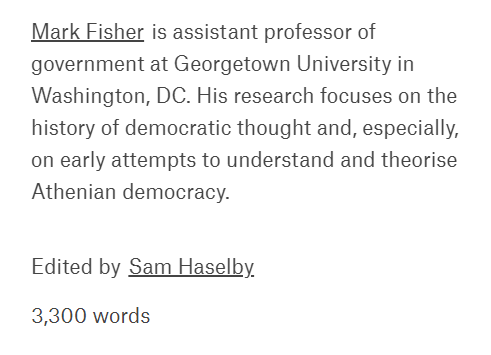Welcome to DU!
The truly grassroots left-of-center political community where regular people, not algorithms, drive the discussions and set the standards.
Join the community:
Create a free account
Support DU (and get rid of ads!):
Become a Star Member
Latest Breaking News
General Discussion
The DU Lounge
All Forums
Issue Forums
Culture Forums
Alliance Forums
Region Forums
Support Forums
Help & Search
What would Thucydides say?

In constantly reaching for past parallels to explain our peculiar times we miss the real lessons of the master historian
https://aeon.co/essays/what-thucydides-really-thought-about-historical-analogies


In the weeks after Louis-Napoléon Bonaparte seized power and declared himself Napoleon III, Emperor of the French, Karl Marx sat down to write a history of the present. The purpose of this work was straightforward. Marx wanted to understand how the class struggle in France had ‘made it possible for a grotesque and mediocre personality to play a hero’s part.’ Much of The Eighteenth Brumaire of Louis Bonaparte (1852/69), as the work would be known, accordingly consisted of fine-grained political and economic analysis. But Marx opened in a more philosophical vein. After quipping that history repeats itself first as tragedy and then as farce, he reflected upon the role that historical parallelism played in shaping revolutionary action:
The tradition of all the dead generations weighs like a nightmare on the brain of the living. And just when they seem engaged in revolutionising themselves and things, in creating something that has never yet existed, precisely in such periods of revolutionary crisis they anxiously conjure up the spirits of the past to their service and borrow from them names, battle-cries and costumes in order to present the new scene of world history in this time-honoured disguise and this borrowed language.
This tendency had pervaded European history, Marx thought, and occasionally served the ends of progress. The cloak of Roman republicanism, for instance, had helped French society lurch blindly forward during the revolution of 1789. In the present case, however, the appropriated symbolism of that earlier revolution served no higher purpose than to veil a grifter’s power grab in a more compelling guise.
Marx points toward one of the more paradoxical tendencies of modern political life: the more times feel unprecedented, the more we reach for past parallels. We do so, however, not only to legitimate new regimes. Just as often, historical analogies are invoked to explain, predict and condemn. The past decade alone offers a trove of examples. Among them, the use of ‘fascism’ to characterise Right-wing populist movements has generated the most heat, giving rise to a multifaceted debate about the legitimacy of historical analogy as a mode of political analysis. But there are others that have occasioned less self-reflection. In reckoning with the possibility of open conflict between the United States and China, for instance, foreign policy experts have routinely likened the escalating tension to the Cold War, the First World War, and even the Peloponnesian War. Similarly, in the early days of COVID-19, many dealt with the uncertainty of the pandemic by turning to the Spanish Flu, the Black Death, and the Great Plague of Athens for guidance. Something of the sort is also happening in real time with generative AI. How we interpret the risk that it poses hinges in large part on which analogy we favour: will it be most akin to the Industrial Revolution, the nuclear bomb, or – perhaps most horrifying of all – the consulting firm McKinsey?
If many of these parallels seem self-evident, one recurring point of reference does not: Thucydides, the ancient Athenian general and author of History of the Peloponnesian War. Though hardly a household name, he has been a favourite of those intent on doom-scrolling the historical record for relevant exempla. In the first month of the COVID-19 shutdown, for instance, so much was written about his account of the Athenian plague that one prominent scholar deemed Thucydides himself to be a virus. Something comparable could be said of Thucydides’ role in the viral discourse surrounding Sino-American relations. Ever since the early 2010s, when Graham Allison began referring to the stress on global order produced by hegemonic rivalry as ‘Thucydides’ Trap’, foreign policy discussions have themselves often appeared trapped by the need to balance geopolitical analysis with exegesis of an ancient text.
snip
InfoView thread info, including edit history
TrashPut this thread in your Trash Can (My DU » Trash Can)
BookmarkAdd this thread to your Bookmarks (My DU » Bookmarks)
0 replies, 460 views
ShareGet links to this post and/or share on social media
AlertAlert this post for a rule violation
PowersThere are no powers you can use on this post
EditCannot edit other people's posts
ReplyReply to this post
EditCannot edit other people's posts
Rec (2)
ReplyReply to this post